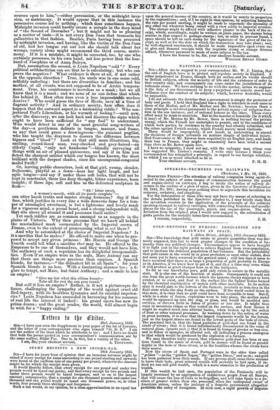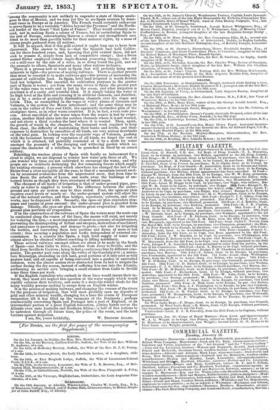GOLD-DEPOSITS IN EUROPE: IRRIGATION AND RAILWA.YS IN SPAIN.
1 Adam Street, Adelphi, 15th January 1853.
Sin—The knowledge that gold exists in greater iquantities than was for- merly supposed, bids fair to work greater changes n the condition of hu- manity than any political changes. Circumstances appear to have brought it to light just at the right period to relieve England from over-population, and to increase the deficient population of her Colonies. But the probability that gold exists in the world in as great profusion as most other metals, does not seem yet to have occurred to the general mind ; still less does it seem to have occurred that there is as large a proportion of gold probably in Europe as in America, if we knew how to get at it., and that a time may conic when it will produce as great changes here as at the Antipodes.
So far as our knowledge goes, gold only exists in nature in the metallic state. It is also one of the heaviest of metals. Consequently it could not rise from the great world-furnace which the igneous theory supposes to have existed, or to exist, and float to the surface like the lighter bodies formed by the chemical combination of metals with other materials. In its molten state it would sink to the bottom of the furnace, precisely as iron does in the fluid state while the slag floats on the surface, if the world cooled down in this state, it is clear that no gold could have been accessible to man. But if, while in a state of fusion, explosions were to take place, the molten metal would be squeezed up into the slag, or glass, and would be moulded into cavities, or thrown forth in flakes of greater or less size. It might thus exist in mountain ridges as they cooled on the surface, and from thence it might be washed down into alluvial basins, when broken up by the action of frost or other natural processes. In washing down by the action of water in great torrents, it is clear that the largest fragments would be the lowest, just as the largest stones are found in the lowest parts of the beds of rivers. The practical fact is, that the finest particles of gold-dust are found in the sands of rivers • that it is found infinitesimally disseminated in the veins of natural glass, quartz rock;) that it is found in lumps of greater or less size, and in flakes or spangles, in alluvial soil, all indicating a process analogous to that which would be produced by the explosion of a furnace.
We may therefore fairly reason, that whenever gold-dust has been at any time found in the Bands of rivers, gold in masses will be found at greater depths in the beds of those rivers, or in the localities whence the rivers have their source.
Now the rivers of Spain and Portugal were in the older time called "golden "—as the "golden Tagus," tho "golden Darro," and soon; and gold has been gathered from their sands. If any process shall cause these streams to leave their beds, great mineral wealth will probably be laid open, if in- deed we can call gold wealth, which is a mere stimulus to the production of wealth.
If this wealth be laid open, the population of the Peninsula' will be largely increased by an aggregation of inchiStrious people from all Europe, that will cause the loss of Cuba to be forgotten, and will raise Spain to a po- sition of greater riches than she possessed when the undisputed owner of American mines unless the jealousy of a despotic government altogether prohibits the entry of foreigners. In such case, a rapid growth of disputes
'among the community is not unlikely to engender a state of things analo- gous to that of Mexico, and we may yet live to see Spain overrun by domi- nant races in Europe as in America. The French would certainly endeavour to prove Spain to be a veritable "Africa beyond the Pyrenees" and the North- ern border of the Great "Salt Lake of France." They would certainlysuc- ceed, not in making Spain a colony of France, but in assimilating Spain to the rest of Europe, concentrating thereon a crossed and strengthened race fitted to do more than guerilla battle for their national rights, by a mass of strong people gathered from all nations. It will be argued, that if this gold existed it ought long ago to have been discovered. The answer to this is—that the Spanish race held Califor- nia for three hundred years, and, knowing that gold existed there, did not seek to possess it, simply from lack of competitive energy ; that a Swiss named Sutter employed certain Anglo-Saxons possessing energy, who did cut a mill-race by the side of a river, in so doing found the gold, and set the i example to others, Spaniards and many other nations inclusive.
There s a process now at work in Spain that will probably bring many minerals to light—the process of making railways. There is another process that must be resorted to to make railways pay—the process of increasing the amount of cultivable land. In Spain, level land irrigated is worth fivefold land not irrigated. The essential for cultivation purposes in the greater part of Spain is water ; yet from the many rivers in Spain the greater part of the water runs to waste and is lost in the ocean, and what irrigation is practised is of a costly and wasteful kind. It is simply taking the water at its high level at the hills and running it in artificial channels, and distribut- ing it by a series of gradually diminishing channels over the slopes and levels. This, as exemplified in the vegas or valley plains of Grenada and Valencia, is the system the Moors introduced ; and the same thing may be seen in the vallies of Peru and Chile, the apparently instinctive plan of the aborigines there, as in other warm countries. It is, in fact, a very rude pro- cess. About one-third of the water taken from the source is lost by evapo- ration, another third sinks into the earthen channels where it is not wanted, and not above a third reaches the land where it is wanted. Then again, the growth of weeds in the channels, the incessant work required keep them clear, the difficulty of maintaining their banks and levels, and their exposure to destruction by casualties of all kinds, are very serious drawbacks on the total gain. In looking over the exquisite yega of Valencia, gushing with the luxuriant beauty of vegetation of all kinds, we forget the cost at Which it is attained, till painfully reminded of it by a strife for water amongst the peasantry of the drooping and withering garden which as- sumes the character of a rebellion, to be quenched in blood by an armed soldiery.
Beholding the treeless plains of Spain with hardly an inducement for a cloud to alight, we are disposed to wonder how water gets there at all. We also wonder why trees are not cultivated to encourage the water, and why people are so recklessly destroying the few remaining forests which supply the existing streams ; a process which elsewhere has changed the bed of the Ilhene from a river navigable all the year, to that of a mountain torrent swol- len by occasional avalanches from the unprotected snow, that from time to time floods the suburbs of Lyons, and melts away the buildings of un- burned bricks as though they were structures of baked sugar. The cheapest of all modes of irrigation is that of under-ground pipes, pre- cisely as water is supplied to towns. The difference between the under- ground and open air system may be thus stated. First, the open-air plan requires exact levels or nearly so : the under-ground system will allow the use of the natural surface, and thus bridges, aqueducts, culverts, and other works, may be dispensed with. Secondly, the open-air plan engenders stop- pages and repairs of great amount': the under-ground plan is guarded from damage. Thirdly, the open-air plan involves great evaporation : the under- ground plan prevents all evaporation. If in the construction of the railways of Spain the waters near the route can be conducted along the course of the lines, the means will exist, not merely for watering the line,—a most important element in economy of maintenance, preventing the disintegrating of ballast and sleepers, destruction of machinery and annoyance to passengers, and damage to goods,—but also for irrigating the borders, and converting them into gardens and farms of more or less extent ; thus securing a population and traffic independent of external cir- cumstances. In a country like Spain, a high level supply of water may almost always be obtained without resorting to lifting machinery.
These several railways amongst others are about to be made in the South of Spain—one from Cadiz to Jerez, another from Jerez to Seville, and the thirdfrom Seville to Cordova ; being in fact a continuous line by cdifferent com- panies. The greater part runs along the valley of the Guadalquivir a minia- ture Mississippi, abounding in rich land, great portions of it only need as wild posture land, and all capable of being converted into a garden of unrivalled richness, were the almost useless river abstracted from its bed to irrigate the surface during the dry season' instead of suffering it to run into the Atlantic, performing no service save bringing a small steamer from Cadiz to Seville some three times per week.
If the English capitalists who embark in these lines would insure their in- terest., they must not neglect this question of the water supply which would rapidly colonize their territory, and make it a desirable winter abode for the many wealthy persons seeking to escape from an English winter. It is the process of making railways, and changing the courses of the rivers for the purposes of irrigation, that will most probably open up deposits of gold and other mineral wealth, changing for a time the course of European emigration till it has filled up the vacancies of the Peninsula ; perhaps commercially converting Spain and Portugal into a part of England, or an intermediate portion of a great English federation, joining hands across the Atlantic even unto Australia and Southern Africa,—a belt of free nations to be unbroken through all future time, the police of the ocean, and the land barriers against despotism.



































 Previous page
Previous page